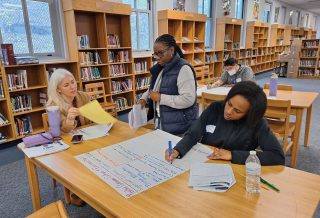FOCUS
In their own words: Native language in the classroom
By Rosita Apodaca, Tabetha Bernstein-Danis and Sara DeMartino
Categories: College- and career-ready standards, English learners, OutcomesApril 2019
Vol. 40 No. 2
Read the remaining content with membership access. Join or log in below to continue.
Sed ut perspiciatis unde omnis iste natus error sit voluptatem accusantium doloremque laudantium, totam rem aperiam, eaque ipsa quae ab illo inventore veritatis et quasi architecto beatae vitae dicta sunt explicabo. Nemo enim ipsam voluptatem quia voluptas sit aspernatur aut odit aut fugit, sed quia consequuntur magni dolores eos qui ratione voluptatem sequi nesciunt. Neque porro quisquam est, qui dolorem ipsum quia dolor sit amet, consectetur, adipisci velit, sed quia non numquam eius modi tempora incidunt ut labore et dolore magnam aliquam quaerat voluptatem.
References
Apodaca, R. (2007). Mediating learning For English learners. Unpublished research presented at the General Administrators Meeting in Austin, TX, and at the California Association for Bilingual Education, San Francisco, CA.
Fung, I.Y.Y., Wilkinson, I.A.G., & Moore, D.W. (2003). L1-assisted reciprocal teaching to improve ESL students’ comprehension of English expository text. Learning and Instruction, 13(1), 1-31.
Genesee, F., Lindholm-Leary, K., & Christian, D. (2006). Educating English language learners: A synthesis of research evidence. New York, NY: Cambridge University Press.
Moser, J.S., Schroder, H.S., Heeter, C., Moran, T.P., & Lee, Y.H. (2011). Mind your errors: Evidence for a neural mechanism linking growth mind-set to adaptive posterror adjustments. Psychological Science, 22(12), 1484-1489.
Rolstad, K., Mahoney, K., & Glass, G.V. (2005). The big picture: A meta-analysis of program effectiveness research on English language learners. Educational Policy, 19(4), 572-594.
Walqui, A., Koelsch, N., Hamburger, L., Garrder, D., Insaurralde, A., Schmida, M., & Weiss, S. (2010, May). What are we doing to middle school English learners? Findings and recommendations for change from a study of California EL programs. San Francisco, CA: WestEd.
Categories: College- and career-ready standards, English learners, Outcomes
Recent Issues
LEARNING DESIGNS
February 2025
How we learn influences what we learn. This issue shares essential...
BUILDING BRIDGES
December 2024
Students benefit when educators bridge the continuum of professional...
CURRICULUM-BASED PROFESSIONAL LEARNING
October 2024
High-quality curriculum requires skilled educators to put it into...
LEARNING TO PIVOT
August 2024
Sometimes new information and situations call for major change. This issue...













